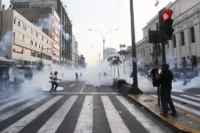
Por qué el modelo Bukele no va a funcionar en otros países de América Latina
Esta semana, los electores de El Salvador le dieron a su presidente de mano dura contra la delincuencia una indicación clara: mantener el curso.
Aunque todavía se están contando los votos, el presidente Nayib Bukele se adjudicó una victoria aplastante las elecciones y afirmó que ganó con más del 85 por ciento de los votos. Si esos resultados se mantienen cuando se anuncie el conteo oficial, ni siquiera los presidentes populistas más conocidos de América Latina, como el presidente venezolano Hugo Chávez o el boliviano Evo Morales, habrán estado cerca de ganar unas elecciones con esos márgenes.
El ascenso sin precedentes de Bukele se explica debido a un factor: el sorprendente descenso en la tasa de delincuencia de El Salvador.… Seguir leyendo »









